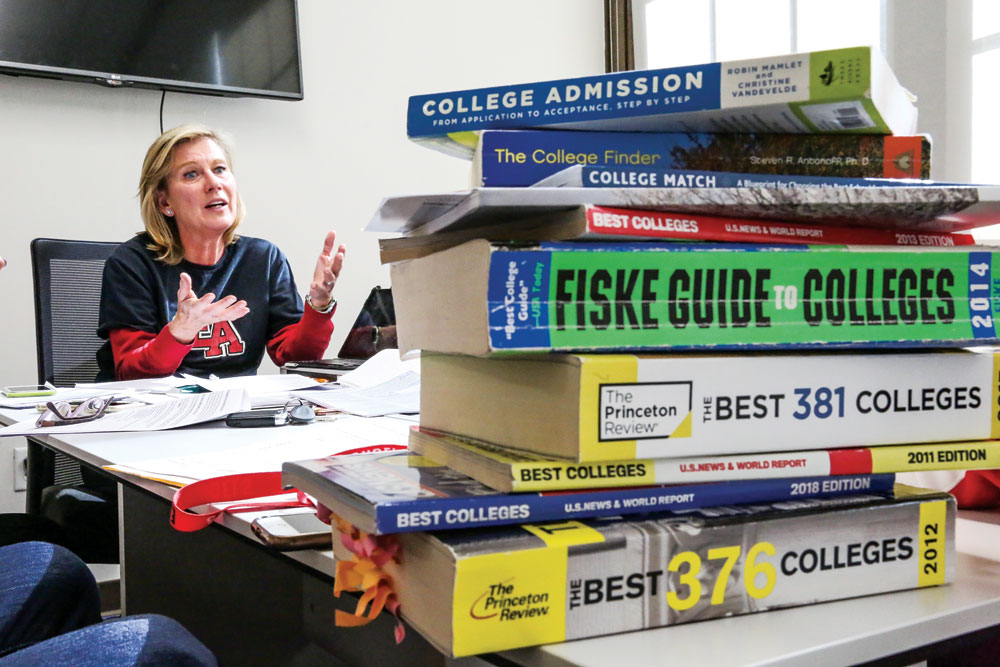
Georgianna Forbes assists students and trains volunteers in the “Life After East” organization, a group that helps low-income and first generation East High School students apply for college.
The college application process has become more complex, more stressful and more expensive than ever before. As the first class of seniors at Northfield High School embark on this journey, counselors, parents and professional coaches share some tips to successfully navigate through the confusing maze.
Seventeen-year-old Shay Mannik has a large year-at-a-glance calendar hanging on a wall at his house with deadlines clearly marked. He’s also created a spreadsheet with more than a dozen colleges he’s researching. A member of the first class at Northfield High School, which will graduate next May, Mannik is determined to stay calm during the frenzied college application process.
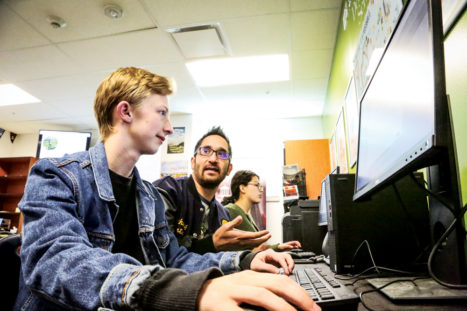
College advisor Zack Montez helps Northfield High School seniors Shay Mannik (foreground) and Rachel Acosta-Medina work on their college applications at the NHS Futures Center.
“It’s hard. I’ve had to prioritize the hell out of everything: homework, volunteering and then applying for colleges. I don’t always get enough sleep,” he admits.
Mannik says he’s done much of his research online, but he’s also used the newly opened Futures Center at his school. The Denver Scholarship Foundation (DSF) has funded 14 of these resource centers that serve 21 Denver public high schools. Zack Montez, the DSF college advisor at Northfield, says his mission is to support all students with their secondary aspirations, whether that’s a technical school, a community college or a traditional 4-year institution.
“You want to go to the school that is the best fit for you, the school that is most supportive of you so that you can do well. And hopefully one that will give you some financial assistance.”
Montez says there are three broad categories that should be given equal weight when considering schools: the academic fit, the social fit and the financial fit. A graduate of Notre Dame University, Montez said unfortunately he didn’t choose a college that was a good match and that’s why he’s so passionate about the work he’s doing.
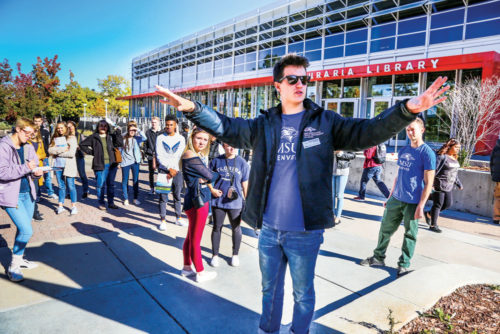
Trevor Gritton-Adkins leads a Metropolitan State University tour tour of the campus following a half-hour orientation for the potential new students.
“The social aspect is very important. I sometimes didn’t feel like I fit in at Notre Dame. I want students to really think about that aspect. Feeling like you belong is very important,” says Montez.
Denver author and college consultant Steven Antonoff has written what some counselors consider a “must have” guide to helping students find that fit. College Match provides worksheets and practical tips to winnow down the choices. Antonoff says it’s also important to get rid of the myths.
“The notion that if it costs more, it’s better. If it’s out of state, it’s better. If it has a well-known football team, it’s better. Students and parents need to eliminate those kinds of barriers when they start their research.”
But Antonoff says it is important for parents to have frank discussions about cost. “Too often parents feel that if they can’t financially support Buffy’s desire to go to Stanford, that they have failed. And that’s just total nonsense.”
Antonoff tells parents to consider three things when exploring costs. One is the availability of need-based aid. Private colleges tend to be more generous than public universities. The second is looking at merit aid. “It’s never been more likely that colleges will provide merit aid,” says Antonoff. “Many give merit aid even to B students if they are from an under-represented population.” Finally, he says, students should consider what he calls good value colleges. “These are schools that have a great faculty but not the big name and they don’t charge as much. Often they are in the midwest or south.”
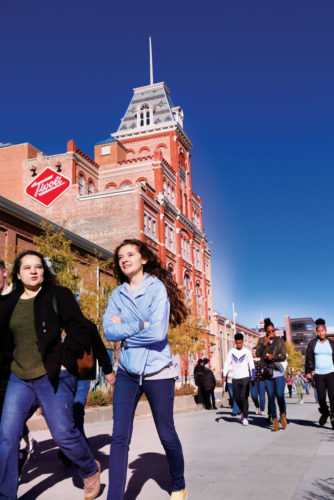
The student union is located in the old Tivoli Brewery building.
Parent Judith Gault said the financial cost was what drove her daughter’s decision to attend the University of Colorado Denver. Erin Leidtke graduated from the International Baccalaureate program at George Washington High School in 2017. But during her senior year, she felt tremendous pressure to consider private schools out of state because that’s where most of her peers were applying.
“Many of the kids in that program are more affluent and that’s what they do, they go out of state. Erin was the exception and that was hard,” said Gault.
But since Leidtke is paying for college entirely on her own, Gault says that the choice was quite clear. Going to a state school and living at home means that her daughter will graduate with no college debt, a big plus since she then intends to go to medical school.
“For your undergraduate degree—especially for the first two years of college—a state university can fulfill all your academic needs. You’re not compromising on your education and you get substantial savings,” says Gault.
East High School Counselor Anne Koshio knows that peer pressure and the stress of meeting deadlines can be overwhelming this time of year for seniors. “I think it’s much more stressful for students now than it used to be. Kids feel like they have to pick the perfect place or all is lost. And the competitiveness is out of control,” says Koshio. It’s one reason why East has decided to hold weekly drop-in sessions so students can talk about their anxieties and get help with applications.
East also has a program called “Life After East,” staffed by volunteers who work with low income and first generation college students. Georgianna Forbes, a mother of two East graduates, helped form the organization six years ago. She says she tries to get students to start focusing on the college application process during their junior year, but the reality is that most wait until they are seniors.
“I would say the number one stumbling block for most kids is writing the essays. They wait until the last minute and panic. And then too often they’re writing stuff that isn’t great.”
Forbes says it’s important to write a personal essay that helps admissions counselors learn more about who the student is. “Colleges hate ‘I learned about teamwork playing on my soccer team.’ That’s just not very interesting. They also don’t want to read about privileged kids going to Costa Rica to build latrines.” Forbes says it’s much better to write a story about a moment when the student learned an important lesson, using lots of interesting details to engage the reader.
Amy Macy, a professional college consultant, who has worked with many students in the Denver metro area, says her main advice about essays is to write about a personal passion.
“Start with something compelling, something that grabs the reader’s attention and then connect it to how that’s impacted you and how it will likely impact your future.”
Macy, who charges between $4,000-$6,000 to work with a student, began her consulting business 5 years ago after working as a teacher, an admissions counselor and finally a director of college counseling at Denver Academy. She’s seen her business grow exponentially and she thinks that’s because the application process has become so complex.
“I tell my students that I’m your mentor, coach, cheerleader and chief nudger. I want to support you to break this down in manageable chunks so you can get it done. Students very rarely want to do it on their own. I think most adults would struggle to do this on their own,” says Macy.
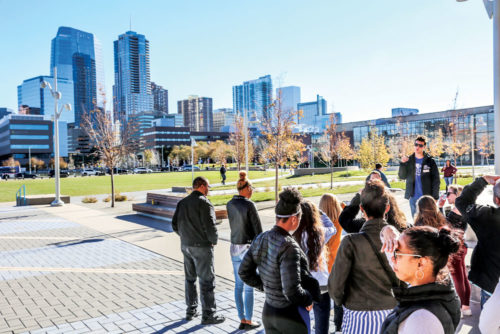
Gritton-Adkins points out Metro’s spectacular view of city and the amenities of the downtown location.
Even though the Common Application was designed to simplify the admission process, Macy believes it encouraged kids to apply to many more schools, so colleges have responded by adding supplemental essays. She has one student who has written 20 essays for both college and scholarship applications.
Macy says she worries about how the application process seems to grow more burdensome every year. And yet she says she’s grateful that the American system is more inclusive of students who may not test well or who aren’t in the top ten of their class. She says it’s far different from the way European schools operate.
“The American system is nice because it’s more holistic. Students have ways of showing—outside of testing—what they have to offer. On the other hand, it’s just creating more work. The European system is all numbers-based and there’s very little that is holistic,” says Macy.
College Application Resources for Students and Parents
College counselors suggest these websites and books as helpful resources during the college application process:
- Niche.com
- CollegeData.com
- College Match by Steven R. Antonoff
- Fiske Guide to Colleges by Edward B. Fiske
- Colleges that Change Lives: 40 Schools that will Change the Way You Think About Colleges by Loren Pope
- Where You Go Is Not Who You’ll Be: An Antidote to the College Admissions Mania by Frank Bruni
- College Essay Essentials by Ethan Sawyer
- The Insiders Guide to the Colleges: Students on Campus tell You what you Really Want to Know by Yale Daily News Staff


0 Comments